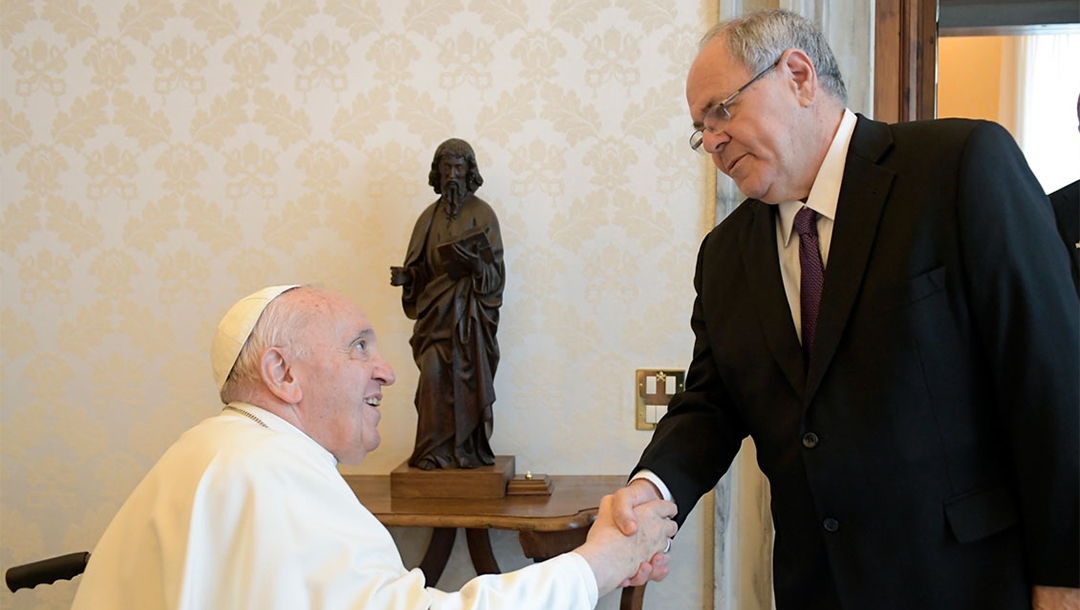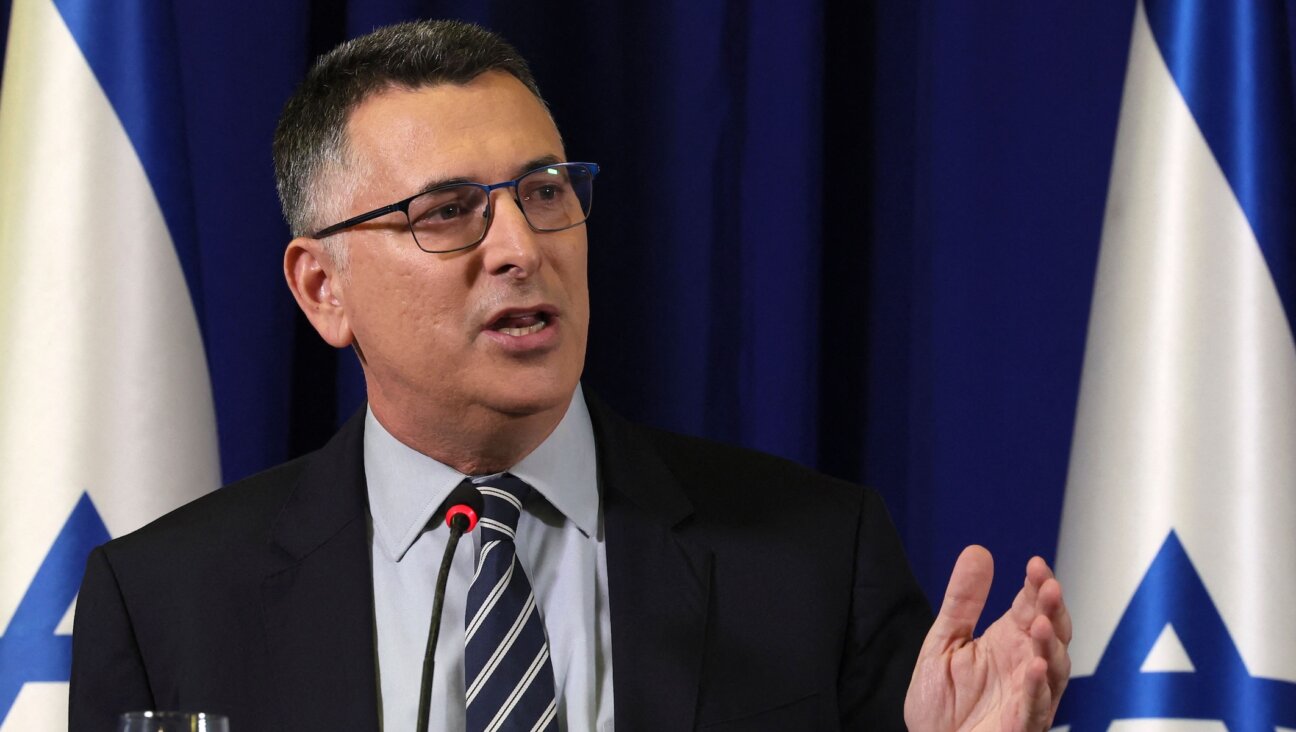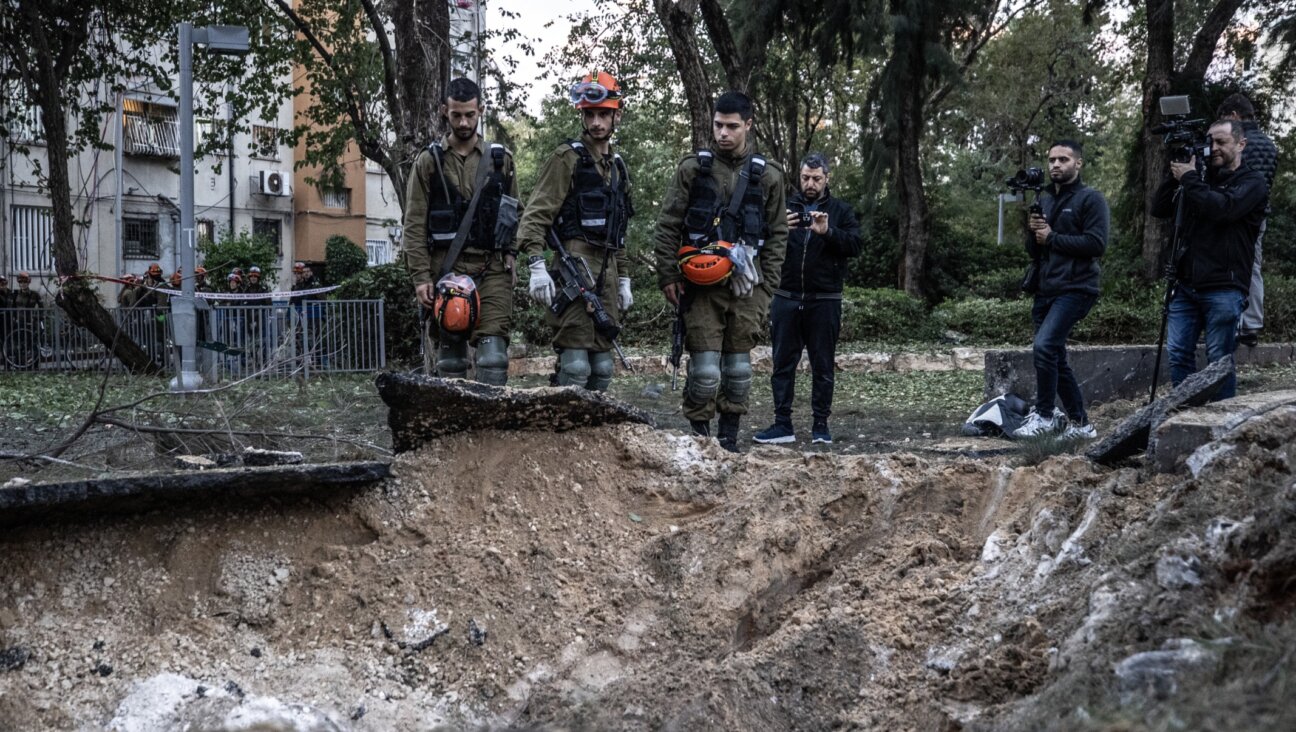In 1st, pope hosts Yad Vashem director at Vatican — but didn’t discuss Catholic Church’s Holocaust controversies
None of the Holocaust-related controversies straining Jewish-Catholic relations came up during the 30-minute meeting by Francis and Dani Dayan.

Pope Francis receives Yad Vashem Director Dani Dayan at the Vatican, June 9, 2022. (Courtesy of Yad Vashem)
(JTA) – Amid controversies concerning the Vatican’s Holocaust-era record, Pope Francis and the head of Israel’s state museum on the Holocaust, Yad Vashem, met for a first-of-its-kind talk.
Yad Vashem Director Dani Dayan met with the pope Thursday at his office in the Vatican. During their 30-minute talk, they spoke about ways to “bolster collaborative activities” in areas of “Holocaust remembrance, education and documentation, and to discuss efforts to fight antisemitism and racism worldwide,” Dayan’s office wrote in a statement.
Dayan thanked the pope for his 2020 decision to open the Vatican’s archives related to the wartime Pope Pius XII, whose critics say did too little to intervene on behalf of the 6 million Jews that the Nazis murdered in the Holocaust.
But they did not discuss the Holocaust-related controversies that for years have been straining Jewish-Catholic relations, Dayan told the Jewish Telegraphic Agency. Instead, Dayan focused on areas of consensus and on strengthening ties with the Vatican, he said.
One of these controversies is the ongoing beatification of Pius XII. Another concerns other archives that Holocaust researchers say are still inaccessible to them. And another is centered on the debate on whether the Vatican should acknowledge and provide more details about what Pius XII did during the Holocaust.
“You don’t sit with the pope on specific files. You sit with the pope on the big issues, on the principles, on the headlines,” Dayan, a former consul general of the State of Israel in New York who became the head of Yad Vashem last year, said when asked whether he brought up any of these issues during the meeting.
Asked whether he had made any requests, Dayan replied: “No need to make requests — for sure, not demands — when all our requests are answered diligently. We are completely satisfied with the attitudes of the pope personally and the Catholic Church, the Vatican.”
Not all Holocaust historians share Dayan’s satisfaction.
Certainly not David Kerzer, a professor of Italian Studies at Brown University whose 2014 book on the pope’s ties to fascism won a Pulitzer Prize.
Kerzer this week published a new book titled “The Pope at War: The Secret History of Pius XII, Mussolini, and Hitler” based on archives opened in 2020 by the Vatican. He told the Jewish Telegraphic Agency Thursday that he hopes the pope will consider “changing the course of the Vatican with respect to the continual denial of the role of the church in the demonization of the Jews that helped to make the Holocaust possible. And also to perhaps reconsider whether they really want to make a saint of Pius VII.”
A 1998 commission set up by the Vatican concluded that the centuries during which the Catholic Church espoused anti-Jewish sentiments as official policy did not lead to the antisemitism that fueled the Holocaust.
The commission’s findings, which have been Vatican policy, is that the church’s theology-based “anti-Judaism” was essentially unconnected to the Nazi “anti-Semitism based on theories contrary to the constant teaching of the Church.”
Kerzer is among the many critics of this reading of history. Those critics argue that the centuries of persecution of Jews led by the Catholic Church paved the way in some ways to the Nazi genocide.
“Forcing Jews to wear yellow badges and keeping them locked in ghettoes were not inventions of the Nazis in the twentieth century, but a policy that the popes had championed for hundreds of years,” Kerzer noted in a 2001 op-ed in the New York Times.
On Thursday, Kerzer said the Vatican was worthy of praise for that decision. But, he added, “there are limitations” on accessing other archives, including the Vatican’s Secretary of State archives and some archives connected to the Inquisition.
Still, Kerzer said that he is “not in a position to say what Mr. Dayan should or should not have said during the meeting” with the pope.
This article originally appeared on JTA.org.
A message from our Publisher & CEO Rachel Fishman Feddersen

I hope you appreciated this article. Before you go, I’d like to ask you to please support the Forward’s award-winning, nonprofit journalism during this critical time.
We’ve set a goal to raise $325,000 by December 31. That’s an ambitious goal, but one that will give us the resources we need to invest in the high quality news, opinion, analysis and cultural coverage that isn’t available anywhere else.
If you feel inspired to make an impact, now is the time to give something back. Join us as a member at your most generous level.
— Rachel Fishman Feddersen, Publisher and CEO




















